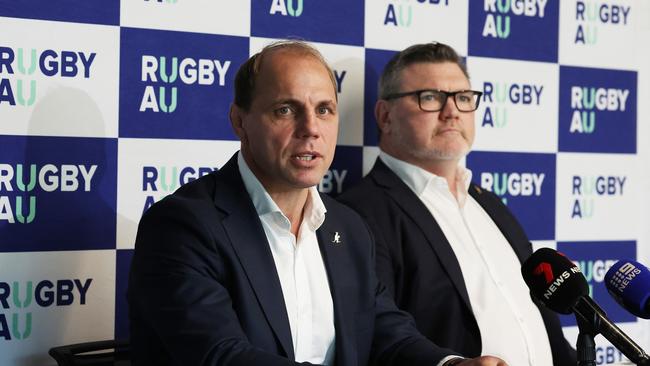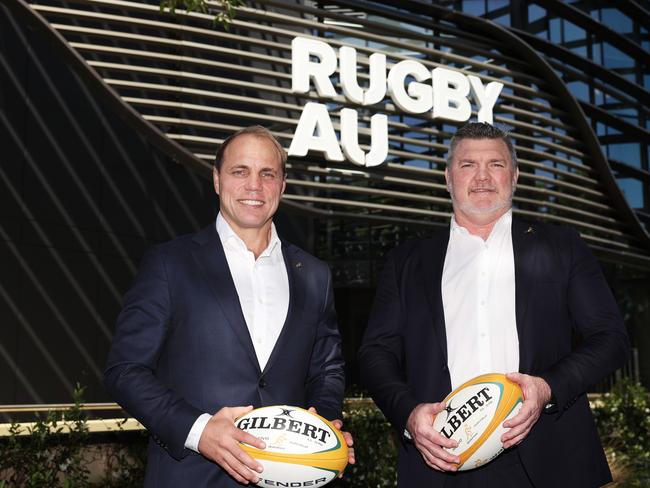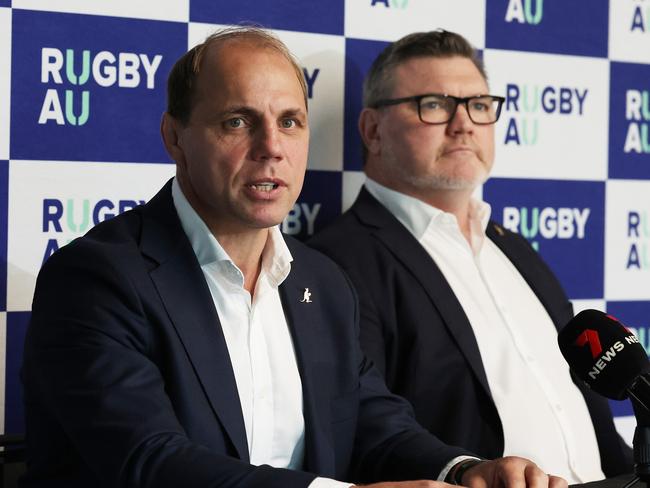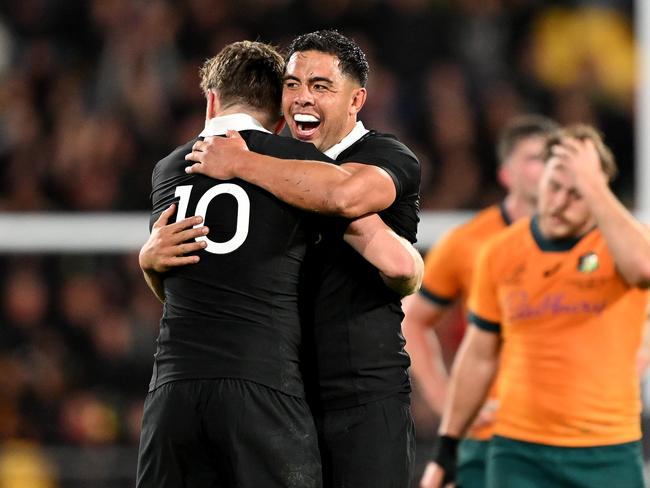No broadcast deal, $80 million debt and wage cuts, but Rugby Australia plans for Wallabies to go No.1
Rugby Australia will consider wage cuts to players and redundancies to staff amid financial pressures, yet still has lofty ambitions for the Wallabies.

Wallabies
Don't miss out on the headlines from Wallabies. Followed categories will be added to My News.
Winning the Bledisloe Cup every two years, and getting the Wallabies to world No.1 is the bold plan announced by Rugby Australia at the same time they expect player wages to shrink and potential redundancies to occur across the game.
The juxtaposed dreams and realities of the game have been laid out by RA chief executive Phil Waugh and chairman Daniel Herbert as part of their strategic plan through to 2029.
Under their high performance goals – a major factor given men’s XVs rugby generates 86 per cent of their revenue – RA wants the Wallabies to win The Rugby Championship and Bledisloe every two years and have two Super Rugby semi-finalists every year, while climbing to be top of the world rankings for the first time in three decades.
But without a new broadcast deal, and carrying a debt of $80 million after taking out a loan to save the game, Waugh acknowledged the challenge ahead.
“We’re certainly well under where we need to be to fund the game with our aspirations,” Waugh said.

“The resourcing and the financial discipline across the ecosystem is the most important point. So without the funding, we can’t actually execute everything we want to do.
“So right now, we don’t have the revenue lines that we require to do everything we’d like to do. Therefore, you have to prioritise different programs depending on the revenues and then making sure you’ve got the cost discipline across the organisation.”
RA has begun negotiations with off-contract Wallabies stars, but given Joseph-Aukuso Suaalii is taking up $5.35 million over the next three years and RA’s pot is meagre, Waugh said Australian and overseas players could expect wage cuts to battle financial pressures.
“We, as 11 national unions of high-performance nations, went to Dublin in between the two Bledisloe Cups this year for 36 hours to talk about financial sustainability at national unions, every national union is under financial pressure, and that’s largely due to player (wage) inflation,” Waugh said.
“So there’s certainly work being done globally through the leadership of (World Rugby chief executive) Brett Robinson and World Rugby to ensure that we’ve got a model, not just in Australia, but worldwide for sustainability. So I think there’s going to be a level of correction, and a little bit of unity.”

As part of their strategic plan, that takes in the 2025 British & Irish Lions series, 2027 men’s and 2029 women’s home World Cups, RA also addresses “right-sizing” their business, which could involve more redundancies.
“I’m talking about structuring the business appropriately to ensure that we’ve got a sustainable model, so naturally that looks at a number of FTE (full-time employees) and your cost base,” Waugh said.
“Equally we’ve got a good opportunity through this next period to maximise our revenue.”
In order to generate more income, with plans to make the Wallabies a global success far from guaranteed, RA is looking to potentially extend the Super Rugby season and grow participation in junior ranks.
But naturally, there will also be some cost-cutting.
“It’s really important, as you know, we’ve got a fairly large debt facility, we’ve got a really good opportunity to pay down that debt facility in 2025 with the Lions,” Waugh said.
“Then we go into the broadcast cycle in 2026 through 2030, and we need to be in a sustainable model through that period. I think an area that we’ve got into historically, with an idea of finances rather than looking at cyclical financial performance, because touring teams dictates how you travel financially.
“So we’ll be working through and have started a long way down that journey, working through the affordability of the game from 2026 through 2030.
“As everyone knows, we’re in a negotiating period with Channel 9 that expires at the end of this month. We’re having constructive conversations with the executive.”
Herbert added: “Spending more doesn’t necessarily guarantee a better result, as we’ve seen in the past. So that’s where we use the word alignment, we need to get more out of what we’ve got right now.
“And that alignment has started this year, and we’ve now got two of the Super Rugby clubs under RA, and we’re working very closely with the other two as well.
“It doesn’t matter how much money we throw at something, sometimes you’re not going to get the result. But we feel we’ve got very strong alignment across all of those Super Rugby clubs from a high performance perspective.”
Both Herbert and Waugh believe the Wallabies, ranked eighth in the world, are capable of being No.1 despite competing against rivals with more money and deeper player pools.

“It will take a number of years before I think we get to that No.1 position, but I do think we’ve got the players and the people involved across the game broadly, across the member unions and Super Rugby clubs, to enable us to get there,” Herbert said.
“But it does require us to do things a little differently to what we’ve done in the past.
“We’ve started out on that journey, but we’re not there yet.”
Waugh added: “We’ve got a long way to go to be number one and it’s not beyond reality to envisage being number one throughout this five-year cycle. We’ve got a long way to go, there’s no doubt.
“If you look at where Ireland were a decade ago, if you look at where South Africa were a decade ago and you look at where they are now and the journey that they’ve been on to get to the best one or two sides of the world, it’s achievable. We just need to ensure that we deliver and execute.”
More Coverage
Originally published as No broadcast deal, $80 million debt and wage cuts, but Rugby Australia plans for Wallabies to go No.1



